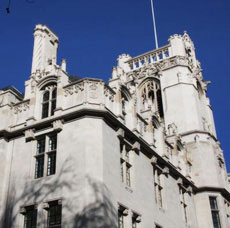Supreme Court finds bail cannot be imposed on a person who cannot be lawfully detained
Garden Court Chambers says that today's Supreme Court judgment in B (Algeria) (Respondent) v Secretary of State for the Home Department (Appellant) [2018] UKSC 5 is a major new ruling on powers to restrict the liberty and freedoms of those who cannot lawfully be detained.
 EIN members can read the judgment here. The Court's press summary of the judgment is here.
EIN members can read the judgment here. The Court's press summary of the judgment is here.
The case involved an Algerian appellant with a "long and complex" immigration history who was detained under the Anti-terrorism, Crime and Security Act 2001. The Secretary of State made a deportation order against him on national security grounds. Following his eventual release from prison, bail conditions were imposed on the appellant, though the Special Immigration Appeals Commission held that there was no reasonable prospect of removing him to Algeria.
The Supreme Court unanimously found in today's judgment that the Secretary of State does not have the power to impose bail under the Immigration Act 1971 on a person who cannot be lawfully detained.
Garden Court Chambers says that by finding bail under the 1971 Act was not appropriate where a person could not be detained lawfully and compatibly with the Hardial Singh principles, the Supreme Court has vindicated core and long standing protections of liberty in the UK's common law.
In addition, Garden Court Chambers noted that the ruling remains highly relevant to the application of the new bail framework under Schedule 10 to the Immigration Act 2016, though no opinion on the lawfulness of the new regime was expressed so this will need to be addressed in a future case.
Garden Court Chambers highlighted the following key points in today's Supreme Court judgment:
- The Court ruled that, as a matter of principle, statutory powers conferring the power to grant bail should be interpreted "strictly and restrictively", applying the fundamental principle of the common law that "in enacting legislation Parliament is presumed not to intend to interfere with the liberty of the subject without making such an intention clear" (paragraph 29);
- While accepting that the grant of bail "is not a determination of the legality of detention" including for the purposes of Article 5(4) ECHR (paragraphs 50-51), the Court noted that the FTT "is clearly entitled to address the Hardial Singh principles" as a relevant factor within a bail application, which had been recognised in the previous Bail Guidance(paragraph 41(3));
- The Court accepted that, "As a matter of legal instinct, the proposition that the ability to exercise a lawful power to detain is a precondition to a power to grant bail seems entirely sound" (paragraph 48);
- The Court noted the possibility of "statutory inroads" into this core principle of the common law (paragraphs 53-54). Nevertheless, the 1971 Act did not make such an inroad, and the general principle prevailed (paragraph 55);
- The fact that a person on bail could be re-detained for breach of bail supported this conclusion since "This would not be possible in the absence of a subsisting lawful power to detain. In the absence of such a power, conditions of bail and recognizances entered into would be unenforceable" (paragraph 32);
- Having rejected the Home Secretary's construction of the 1971 Act, the Court did not need to address whether the statutory scheme under the 1971 Act was compatible with Article 5 ECHR. Powerful submissions were, however, made in particular on behalf of BID, explaining why the Home Secretary 's approach would inevitably conflict with Article 5 of the ECHR, which was based upon and informed by the principles of the UK's common law.
Bail for Immigration Detainees (BID) acted as Intervener in the case.
In reponse to today's ruling, BID Director Celia Clarke said: "BID is delighted that the Supreme Court has confirmed that the Government cannot impose bail conditions on individuals whom it has no right to detain. Bail conditions can constitute a severe constraint on a person’s liberty and are not a ‘soft option’. We are pleased that the court has found that bail conditions can only be imposed where there is a clear legal basis for doing so."